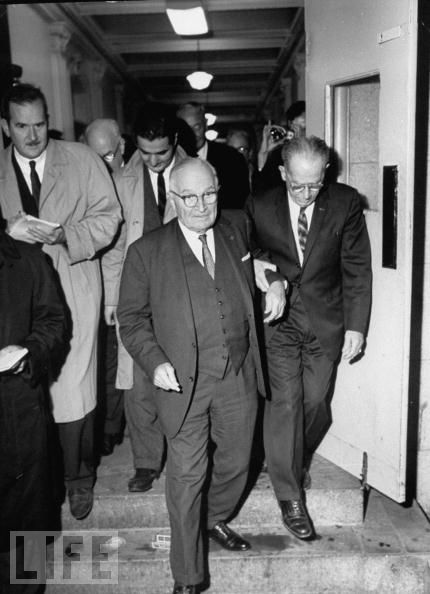The Storm on the Hill

(Harry Truman leaves the White House in the 1960s. Photo LIFE Magazine.)
“For some time I have been disturbed by the way CIA has been diverted from its original assignment. It has become an operational and at times a policy-making arm of the Government. …We have grown up as a nation, respected for our free institutions and for our ability to maintain a free and open society. There is something about the way the CIA has been functioning that is casting a shadow over our historic position and I feel that we need to correct it.”
– President Harry S. Truman, Washington Post, December 22, 1963
I hate working in Chantilly. I mean, the big stimulus bill that didn’t work is still shovel ready and in progress out there on I-66, from Arlington out to the Beltway. It is more concrete than I have ever seen, shimmering in the refractions of the heat index that threatens to get to 106 degrees again today. Getting out of town, even on the reverse commute, was fevered and the other motorists seemed as delusional as I was.
It being July, though, it is the time when sane Washingtonian (oxymoron?) head for the DelMarVa beaches. Once past the major sweep of the new Metro tracks over the highway heading for Tysons and Dulles things got better, and I almost had time to think about what I was doing. I am going to get to the intelligence community in which Mac served after retiring from the Navy, but in order to do so, we have to pass through the lens of the two committees that looked at what had been going on since Harry S Truman set up the national security infrastructure in 1948.
Harry grew concerned about the impact of the document he had signed in the Little White House at the Naval station on Key West.
Institutions have momentum- inertia, if you will. It brings to mind the Newtonian proposition that “A body in motion tends to stay in motion unless acted on by an outside force.”
Mac’s story in Naval Intelligence paralleled that of the community. In 1948, he joined the nascent organization that was transforming itself to deal with the new Main Adversary- the Soviet Union. Along the way of glowering at the Soviet Bear, he supported the surrogate war against the agents of the international communist conspiracy.
The community writ large did what its president’s directed, whether it was training and equipping an invasion fore to overthrow Castro, killing tin-pot dictators in the Congo, or overthrowing elected officials at outside force impacted the intelligence community in 1975, the year of the great retrenchment after the spectacular events in SE Asia was finally done.
Saigon fell while the Pike Committee in the House was getting stonewalled by the CIA, and the Church Committee was industriously chipping away at the secret world.
A guy named Jim Bush used to come and see me when I had an office near the E-Ring of the Pentagon. He was an older man, and long retired, but he was extraordinarily well connected. He had been on the House Select Committee on Intelligence- one of the institutions that was established in the wake of the disclosures about the community- and eventually became the Budget Director.
In that position, he interacted with Mac, on the Community Management Staff, another institution of the Great Reform, and that is what piqued my interest in what happened.
Jim needed a government sponsor for his clearance, and in exchange for a once-a-quarter briefing on what he knew about what was really going on, I was happy to accommodate him. Jim had come out of the Air Force, where he started in B-29s, flying against the Empire of the Sun, and wound up as a full bird Colonel before specializing in the oversight of the intelligence agencies.
He used to tell me stories about the first Chairman of the Committee, legendary lawmaker Eddie Boland of Springfield, Massachusetts. Eddie came well equipped to deal with anything that might come up from the Secret world. After all, his roommate was Tip O’Neil, whose wife stayed back in Boston, and ultimately became famous for continuing the war with the executive branch that resulted in the Boland Amendment, which blocked further funding of the Contras in Nicaragua.
Jim told me that one of the most impressive things about Chairman Eddie was that he did not marry until he was 62, and then fathered four children.
Gives me hope, in some vague direction. I will have to tell part of Jim’s story for him, since he passed a couple years ago, taking many of the secrets with him. Not all, though.
But we will deal with the Committees and their legacy tomorrow, when I am done with Chantilly.
Copyright 2011 Vic Socotra
www.vicsocotra.com
